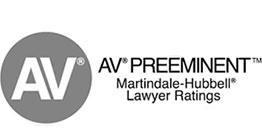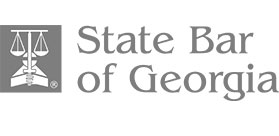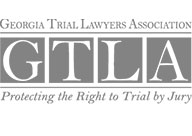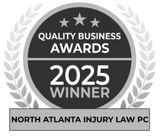What Are Your Rights After a Dog Bite in Milton, GA?
If a dog has injured you or a family member in Milton, you have the right to seek compensation for the harm. Many people in Georgia mistakenly believe they have no options unless the dog has a known history of aggression. This is a common misunderstanding of the law.
The truth is, Georgia’s dog bite laws are not based on a simple “one-bite rule.” An owner can be held responsible even for a first-time bite if their carelessness led to the injury, such as violating a local leash ordinance.
We know that while you are healing, the last thing you want to do is decipher legal statutes and handle insurance paperwork. Our Milton dog bite lawyer practice is built to help people in your exact situation. If you have questions about what happened, we provide clear answers. Call North Atlanta Injury Law for a no-cost, confidential consultation at (770)988-4000.
Milton Dog Bite Guide
- What Are Your Rights After a Dog Bite in Milton, GA?
- Key Takeaways for Dog Bite Victims in Milton, GA
- Why Choose North Atlanta Injury Law?
- What Compensation Is Available in a Georgia Dog Bite Claim?
- Georgia’s Dog Bite Law Is Not a “One-Bite Rule”
- The Lasting Impact of a Dog Attack
- How We Handle the Insurance Company for You
- Steps to Protect Your Claim After a Dog Bite
- Frequently Asked Questions About Milton Dog Bite Claims
- North Atlanta Injury Law Is Ready to Help
Key Takeaways for Dog Bite Victims in Milton, GA
- You may have a valid claim, even if the dog has never bitten anyone before. Georgia law allows you to hold an owner responsible if they violated local leash laws or acted carelessly, regardless of the dog’s history.
- Compensation can cover more than just medical bills. You may be entitled to payment for emotional trauma, scarring, lost wages, and future care—not just your immediate expenses.
- The dog owner’s insurance may cover your damages. In most cases, compensation comes from a homeowners or renters insurance policy, not the dog owner’s personal assets. That means you don’t have to choose between getting help and preserving relationships.
Why Choose North Atlanta Injury Law?
When you are dealing with the physical and emotional pain of a dog bite, you need a legal team that provides both compassionate support and determined representation. At North Atlanta Injury Law, we are committed to being that for you. We understand the challenges you face and are dedicated to guiding you through the legal process with clarity and care.
Our Commitment to You:
- Direct Communication: You will work directly with our legal team. We make sure your questions are answered and you are always aware of the status of your case, so you never feel left in the dark.
- No Win, No Fee: We handle dog bite cases on a contingency fee basis. This means you pay us nothing unless we successfully recover compensation for you. The initial consultation is always free, with no obligation.
- A Focus on Personal Injury: Our practice is dedicated to helping injured individuals. This allows us to have a deep understanding of the legal and procedural steps required to build a strong claim on your behalf.
- Local Knowledge: We serve the Milton and North Atlanta communities. We understand the local ordinances in Fulton County that may play a significant part in your case and how to apply them effectively.
What Compensation Is Available in a Georgia Dog Bite Claim?
The goal of financial compensation is to help you recover the losses you suffered because of the attack. It is meant to restore you, as much as possible, to the position you were in before the injury occurred. A settlement or award accounts for not just the bills you can see, but also the personal impact the injury has had on your life.
We typically pursue three categories of damages for our clients. These are designed to cover every aspect of the harm you have endured.
Economic Damages: The Tangible Costs
These are the verifiable financial losses you have incurred as a direct result of the injury.
- Medical Bills: This covers everything from the initial emergency room visit and ambulance ride to ongoing physical therapy or future surgeries for scar revision.
- Lost Wages: Compensation for the time you were unable to work while recovering.
- Future Lost Earning Capacity: If the injury permanently affects your ability to perform your job or requires you to take a lower-paying position, this compensates for that future loss.
- Psychological Counseling: The cost of therapy to address trauma, anxiety, or PTSD resulting from the attack is a legitimate and recoverable expense.
Non-Economic Damages: The Human Cost
These losses are intangible but just as real. They compensate you for the personal toll of the injury, which frequently rewrites aspects of your daily life.
- Pain and Suffering: For the physical pain and emotional distress you have experienced and may continue to experience.
- Scarring and Disfigurement: Compensation for permanent changes to your appearance, which can be particularly significant in dog bite cases, especially those involving the face, hands, or legs.
- Loss of Enjoyment of Life: If the injury prevents you from participating in hobbies, exercise, and activities you once loved, you can be compensated for this loss.
Punitive Damages: Holding Reckless Owners Accountable
In some rare cases, Georgia law allows for punitive damages. These are not meant to compensate you for a loss, but rather to punish the dog owner for particularly reckless or malicious behavior and to discourage similar conduct in the future. An example might be a situation where an owner knowingly keeps a dangerous dog without any precautions or even encourages the dog to act aggressively. To secure these damages, we must prove the owner’s actions showed a willful disregard for the safety of others.
How Does Georgia’s “Modified Comparative Fault” Rule Affect Your Claim?
Georgia law follows a rule called “modified comparative fault” that could reduce your compensation if you are found partially at fault for the incident. For example, an insurance company might argue you provoked the dog, even if you did nothing of the sort. This legal concept means your percentage of fault reduces your final compensation amount.
If you are found to be 49% or less at fault, your compensation is reduced by that percentage. However, if you are found to be 50% or more at fault, you cannot recover any compensation at all. Our role is to build a strong case with all available evidence to ensure no blame is unjustly placed on you.
Georgia’s Dog Bite Law Is Not a “One-Bite Rule”
So, What Does the Law Actually Say?
Many people are discouraged from seeking help because they believe in a strict “one-bite rule,” which would mean a dog owner is only liable if their dog has bitten someone before. This is a common and unfortunate myth. The reality in Georgia provides more than one way to hold a dog owner accountable.
The relevant statute is O.C.G.A. § 51-2-7. This law provides two main paths to hold an owner responsible, and only one of them requires a history of aggression.
Path 1: Proving the Owner Knew the Dog Was Dangerous
This is the traditional route people think of as the “one-bite rule.” To succeed here, you must show two things:
- Vicious Propensity: The dog had a known tendency to be dangerous. This doesn’t have to be a prior bite; it could be evidence of lunging, growling, or other aggressive actions.
- Owner’s Knowledge: The owner was aware of this dangerous tendency.
Proving what an owner knew can be difficult. It often relies on finding past evidence of the dog’s behavior, like testimony from neighbors or previous animal control reports. This is why the second path is so important for many victims.
Path 2: Proving the Owner Was Negligent (The Leash Law Provision)
This is frequently the stronger path for victims in Georgia. An owner can be held liable, even for a first bite, if the injury occurred because the owner was careless or violated a local animal control ordinance. This shifts the focus from the dog’s past to the owner’s actions in the present moment.
Example: The City of Milton has adopted Fulton County’s animal control ordinances. These rules require dogs to be on a leash no longer than six feet and under the owner’s control when off their property. If a dog bites you in a public park like Bell Memorial Park or while you are walking in your neighborhood because it was not on a leash, the owner has violated a local ordinance. This violation can be used as direct evidence of the owner’s negligence, making them responsible for the harm their dog caused. We will investigate all local ordinances that apply to your case to build the strongest argument possible.
The Lasting Impact of a Dog Attack
The physical and emotional consequences can linger for months or even years, changing how you live your daily life. Nearly one in five people bitten by a dog requires medical attention.
- Infection Risk: Up to 18% of dog bites become infected with bacteria. Germs like Pasteurella are present in over half of infected wounds and can cause serious complications if not treated properly.
- Nerve Damage: Deep puncture wounds can damage nerves, leading to chronic pain, numbness, or loss of function in the affected area.
- Scarring and Disfigurement: The physical reminders of an attack can be permanent. In one recent year, nearly 27,000 people in the U.S. required reconstructive surgery due to dog bites.
- Psychological Trauma: The emotional scars are often as deep as the physical ones. Victims may develop PTSD, a persistent fear of dogs (cynophobia), anxiety, and depression. These conditions can make it difficult to go for a walk, visit friends with pets, or even feel safe at home.
How We Handle the Insurance Company for You
The dog owner’s homeowners or renters insurance policy is typically the source of compensation in a dog bite claim. It is important to remember that the insurance company is a business, and it must balance paying claims with remaining profitable. This dynamic places your interests in conflict with theirs.
Their adjusters are trained to conduct a thorough investigation into every claim. They will look for any information that could reduce the value of your claim, such as suggesting you provoked the dog or that your injuries are not as severe as you say.
What to Look Out For:
- A Quick Settlement Offer: An insurer might make a low offer before the true extent of your injuries is known. An early offer may not account for future medical needs, like scar revision surgery or ongoing therapy. Accepting it closes your case for good.
- Requests for a Recorded Statement: You are not obligated to provide a recorded statement to the other party’s insurer. These can be used to find inconsistencies in your story or get you to say something that harms your claim, even unintentionally.
When you hire us, we immediately take over all communication with the insurance company. You can focus on healing while we handle the paperwork, phone calls, and negotiations. We present the evidence of the owner’s liability and a detailed accounting of all your damages. This guarantees the insurer has a full picture of what you have lost and prevents them from dealing with you directly during a vulnerable time.
Steps to Protect Your Claim After a Dog Bite
While our team handles the legal work, there are several things you should do to strengthen your case and protect your right to fair compensation. These steps help create a clear and undeniable record of how the injury has affected you.
- Follow Your Doctor’s Treatment Plan: Attend all follow-up appointments, take prescribed medications, and complete any physical therapy sessions. This helps your physical recovery and also creates a clear medical record of your injuries and the treatment required.
- Keep a Pain and Recovery Journal: On a simple notepad, briefly note your daily pain levels, any activities you can no longer do, and the emotional impact of the injury.
- Track All Your Expenses: Keep every receipt related to the incident. This includes medical bills, prescription costs, over-the-counter supplies, and even mileage for trips to the doctor’s office.
- Avoid Discussing the Incident on Social Media: Insurance companies frequently review the social media profiles of claimants. A simple post or photo could be taken out of context and used to argue that your injuries are not as severe as you claim. It is best to refrain from posting about the incident or your recovery.
- Direct All Questions to Our Office: If the dog owner or their insurance company contacts you, simply refer them to us. You do not need to speak with them, and it is better for your case if you do not.
Frequently Asked Questions About Milton Dog Bite Claims
What if the dog owner is a friend or family member?
This is a common and understandable concern. Filing a claim is not about punishing your friend or relative. The claim is made against their homeowners or renters insurance policy, not their personal assets. These policies exist specifically to cover these types of incidents, and using the policy for its intended purpose is the responsible way to handle the financial fallout of an injury.
How long do I have to file a dog bite lawsuit in Georgia?
In Georgia, the statute of limitations for most personal injury cases, including dog bites, is two years from the date of the injury. While that may seem like a long time, it is best to act much sooner to preserve evidence and witness memories.
Does it matter what breed of dog bit me?
No. Georgia law does not single out specific breeds as being inherently dangerous. Liability is determined by the individual dog’s history and the owner’s actions—or inaction—not its breed. An owner of a small dog can be just as liable as the owner of a larger one.
What is the role of an Animal Control report?
Reporting the bite to Fulton County Animal Services is a very important step. An animal control report serves as official, third-party documentation of the incident. It can establish the dog owner’s identity, document leash law violations, and may even uncover a history of prior aggression. This report often becomes a key piece of evidence in proving liability.
What if my child was the one who was bitten?
Children are the most frequent victims of dog bites, and their injuries are usually more severe, with bites to the head and neck region being common. Georgia law recognizes the vulnerability of children.
Any settlement for a minor usually requires court approval to ensure the child’s interests are protected. The emotional trauma can also be significant, potentially leading to developmental challenges or a lifelong fear of animals.
North Atlanta Injury Law Is Ready to Help
You do not have to figure out the next steps alone. Let our experienced Milton personal injury lawyer provide the clarity and support you need to move forward with confidence.
For a free, confidential review of your case, call North Atlanta Injury Law today at (770) 988-4000.
North Atlanta Injury Law PC – Milton Office
Address: 12610 Crabapple Road Suite 201 Milton, GA 30004
Contact No: (770)988-4000








